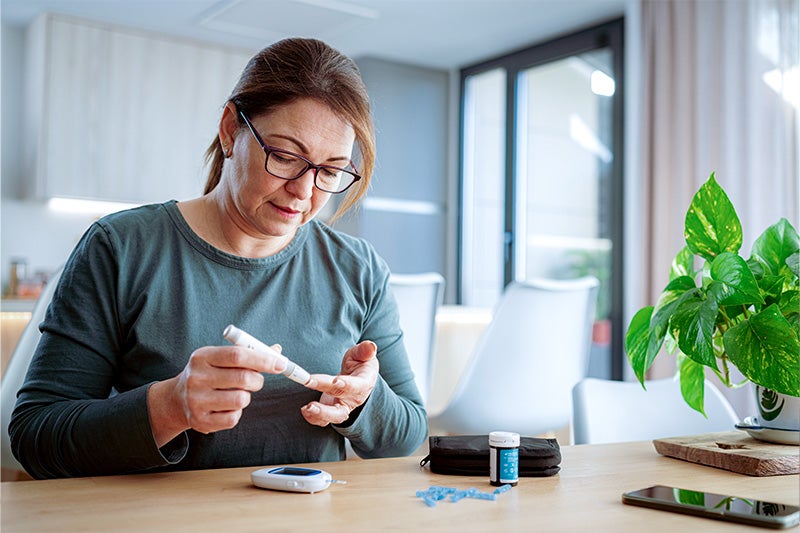
Endocrine Specialists of Athens
Phone & Address
2470 Daniells Bridge Rd
Bldg 200 Ste 221
Athens, GA 30606
Hours
Appointments & Patient Information
All visits are by appointment only, ensuring personalized care. While we strive to keep on schedule, emergencies may occasionally cause delays. If you need to reschedule or cancel, please notify us as early as possible.
- New patients should arrive 30 minutes early to complete registration.
- If your insurance plan requires a referral, please obtain approval before your appointment.
- To ensure we have the most up-to-date information, kindly inform us of any changes to your name, address, phone number, or insurance details.
Expert Endocrinology Care at Endocrine Specialist of Athens
At Endocrine Specialist of Athens, we are dedicated to providing top-tier endocrinology and diabetes care to patients in Athens, GA, and the surrounding areas, including Oconee County, Clarke County, Watkinsville, Bogart, and Winterville. Our team partners with you and your healthcare providers to deliver comprehensive endocrine treatment for a wide range of conditions, including thyroid disorders, diabetes management, hormone imbalances, osteoporosis, and adrenal and pituitary disorders.
Services Offered at Endocrine Specialists of Athens
- Diabetes and related complications
- Diseases of thyroid dysfunction: hyper and hypothyroidism
- Thyroid nodules
- Thyroid cancer
- Diseases of the pituitary: adenoma evaluation and management of states of hormonal excess or deficiency
- Diseases of the parathyroid glands (hyper/hypocalcemia)
- Diseases of the adrenal glands, including nodules, and hyper-and hypofunctioning states (Cushing's syndrome, adrenal insufficiency)
- Osteoporosis and metabolic bone disease
Collaboration With Other Experts
We take pride in having the ability to collaborate with other area experts as we assist in your care. An essential member of your team is your primary care provider. We ask that all patients have a recent visit with their primary care physicians within 4-6 months of our visits. Referrals are required for initial visits. There may be times or circumstances that cause you to seek hospital care. We hope to guide and keep you on a path of health and wellness.
We devote our time to outpatient medicine and utilize the services of area Hospitalists, providing care during any hospitalization.
Additional Resources
Newly Diagnosed Diabetes
Type 2 Diabetes Overview
Hyperthyroidism
Diabetes Education Meeting
The Outpatient Diabetes Education meeting is on the first Tuesday of every month from 3 to 4 p.m. The goal of this meeting is to provide patients with the best information about diabetes. It is hosted by a registered RN who specializes in diabetes, and it lasts for an hour. If you are interested, please email Cheryl Elder at cheryl.elder@stmarysathens.org to register. This meeting is currently held via Zoom but will eventually go back to in-person.
Frequently Asked Questions about Diabetes
What is the purpose of testing my blood sugar?
Your blood glucose readings will greatly assist in evaluating how well your current diabetes treatment plan is working. Regular blood sugar monitoring can help assess what part of your diet, physical activity, or medication needs might need to be changed.
When is the best time to test my blood sugar?
Since every patient has an individual treatment plan, it is best to consult your physician about the best testing times for you.
How often should I test my blood sugar?
This is also based on the individual and what treatment plan has been dictated by your physician. All testing supplies such as lancets and strips require a prescription.
How can I be sure my meter is giving an accurate reading?
All of the meters recommended by our office have been FDA-approved. However, all meters have a variance of up to 20%. It is best to replace your meter every 3-5 years and keep tabs on the expiration date of your test strips. If your test strips are expired, there is a much higher chance of obtaining an inaccurate reading.
What does it mean to have hypoglycemia?
It means that you have a blood sugar of less than 70 mg/dL which can be very serious if left untreated.
What are some symptoms of low blood sugar?
Symptoms can include trembling, rapid heartbeat, inability to focus, perspiring, feeling weak or excessive irritability.
How should I treat my low blood sugar?
You may ingest 4 ounces of juice, 4 ounces of regular soda, or 4 glucose tablets and wait 15 minutes. At that time, go ahead and check your blood sugar again to see if it has risen back to a normal level.
Is eating chocolate helpful for low blood sugar?
No, it is not. It’s very fatty and therefore slows down the process of your body’s absorption of carbohydrates. Hypoglycemia is serious and needs to be addressed immediately.
Is hypoglycemia really that dangerous?
Yes, in fact, it may be life threatening. Non-treatment of hypoglycemia has been known to cause unconsciousness, coma, and in some cases, death.
Does taking insulin mean my diabetes is out of control?
Not at all. The goal for any diabetic is to maintain normal glucose levels. Insulin is often used along with a healthy diet and exercise to support normal blood sugars.
Is all insulin administered with a syringe?
Insulin can be administered in a few different ways. While the syringe is common, it can also be given through a pen or an insulin pump.
Are there certain foods that may cause my blood sugar to go up?
There is no question that Carbohydrate-rich foods like bread, pasta, potatoes, fruit and fruit juice, rice, and desserts will cause blood sugars to rise. Carbs can also be found in many fluids like regular soda, sweet teas, sports drink,s and alcohol.
Do I need to completely cut carbohydrates from my diet?
You may still have carbs but in limited quantities. Our dietitian can help you customize a meal plan that regulates your carbohydrate intake.
Can I drink soda?
You may drink diet soda but it’s not a healthy option. It’s always best to reach for water when you are thirsty.
Is it OK to eat as much fruit as I want?
Your dietitian can help you determine how much fruit should be included in your daily eating habits. Fruit has its fair share of carbs that must be accounted for in order to regulate your blood glucose.
Can I eat as much sugar-free food as I’d like?
Just because a food is labeled “sugar-free” does not mean it is free of carbohydrates. These foods should be eaten in limited quantities.
Endocrine Specialists of Athens accepts most forms of insurance.
For a full list of what insurance providers we accept, please visit our accepted insurance page.






